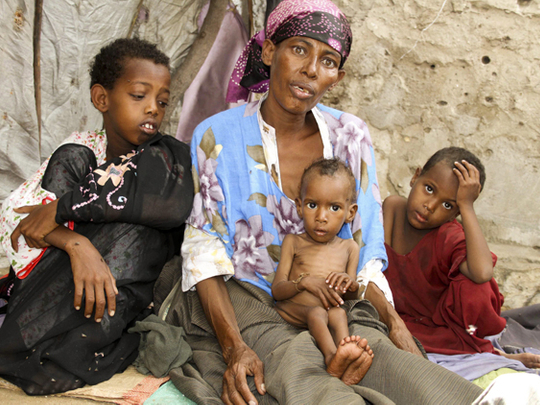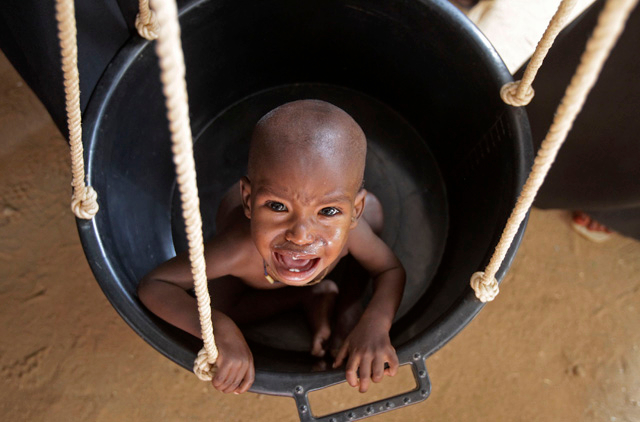
Geneva: Some 40,000 famine-hit people have fled to the Somali capital Mogadishu over the past month in search of food and water, the UN refugees agency said Tuesday.
"Over the past month, UNHCR figures show that nearly 40,000 Somalis displaced by drought and famine have converged on Mogadishu in search of food, water, shelter and other assistance," said Vivian Tan, spokeswoman for the UN High Commissioner for Refugees.
"A further 30,000 have arrived at settlements around Mogadishu.
"In total, it is estimated that Mogadishu has received up to 100,000 internally displaced people over the last two months. The daily numbers are still around 1,000 in July," added the spokeswoman.
With relief supplies entering the country currently insufficient to cope with needs, the jostle for food "has caused serious crowd crushes and even some looting".
Vulnerable
"As a result, some of the weakest and most vulnerable are left with nothing, despite the best efforts of agencies and charities," said the UNHCR.
The UN last week declared famine in two parts of southern Somalia.
An estimated 3.7 million people in Somalia - around a third of the population - are on the brink of starvation and millions more in Djibouti, Ethiopia, Kenya and Uganda have been affected by the worst drought in the region in 60 years.
Food to be airlifted
The UN World Food Programme was set on Tuesday to start airlifting food to Somalia, Ethiopia and Kenya after an emergency meeting in Rome on the drought-stricken Horn of Africa region.
An estimated 3.7 million people in Somalia - around a third of the population - are on the brink of starvation and millions more in Djibouti, Ethiopia, Kenya and Uganda have been struck by the worst drought in the region in 60 years.
WFP chief Josette Sheeran said her organisation would begin food airlifts to the Somali capital Mogadishu, as well as aid flights to Dolo in Ethiopia on the border with Somalia and to Wajir in northern Kenya, which has been badly hit by drought.
'Little chance of survival'
The plight of children in Somalia is "the worst I have ever seen," she said, after visiting Mogadishu and the Dadaab refugee camp in Kenya over the weekend.
"What we saw is children who are arriving so weak that many of them are in stage four malnutrition and have little chance - less than 40 per cent chance - of making it," Sheeran said.
"The catastrophic situation demands massive and urgent international aid," Jacques Diouf, head of the UN Food and Agriculture Organisation (FAO), told participants at Monday's Rome meeting.
"It is imperative to stop the famine," declared by the UN this month in two insurgent-held areas of southern Somalia, Diouf said.
Emergency
Officials said at Monday's meeting the UN has received about $1 billion (696 million euros) since first launching an appeal for the region in November 2010 but needs a billion more by the end of the year to cope with the emergency.
The World Bank on Monday pledged more than $500 million, with the bulk of the money set to go towards long-term projects to aid livestock farmers while $12 million would be for immediate assistance to those worst hit by the crisis.
But charities voiced disappointment at the international response.
"It is shameful that only a few of the richest and powerful economies were willing to demonstrate today their commitment to saving the lives of many of the poorest and most vulnerable," said Barbara Stocking, the head of Oxfam.
U2 band frontman and anti-poverty campaigner Bono's charity ONE said: "The political will manifested in Rome should be followed by action".
French Agriculture Minister Bruno Le Maire called for the creation of a rapid reaction unit within FAO to respond to food crises, more research into drought-resilient crops and a crackdown on high food prices.
"If we don't take the necessary measures, famine will be the scandal of this century," Le Maire said. He also berated the international community for having "failed" to ensure food security in a world affected by climate change.
Le Maire said the issue would be discussed at "the donor conference in Nairobi in two days' time." A spokesman for the FAO later specified this was not a pledging conference but a regular meeting to which donors had been invited.
Survivors
UN officials say the drought has killed tens of thousands of people in recent months, forcing hundreds of thousands of desperate survivors from the worst-affected areas of Somalia to walk for weeks in search of food and water.
The key challenge for aid groups has been reaching parts of southern Somalia held by the Al Qaida-inspired Islamist militia group Shebab, which has banned WFP and other international humanitarian agencies from operating on its territory.
Somali Deputy Prime Minister Mohammad Ebrahim called for "humanitarian corridors" to reach the affected areas.












